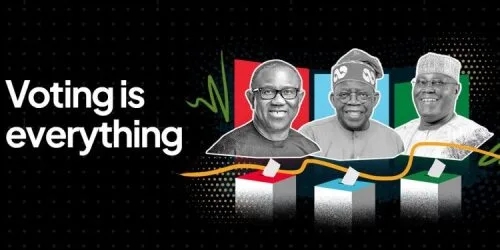

All Progressives Congress’s Bola Tinubu is likely to do well in two of the country’s biggest voting states - Kano and Lagos.
According to a recent survey commissioned by Enough is Enough Nigeria (EiE Nigeria) and conducted by SBM Intelligence, the country’s upcoming 2023 presidential election is set to be highly competitive, with no clear front-runner.
This marks the first time since the 1960s that Nigeria has seen three competitive political blocs largely divided along old regional lines.
The report added that the All Progressives Congress’s Bola Tinubu is likely to do well in two of the country’s biggest voting states – Kano and Lagos.
The survey polled 11,534 Nigerians across the 36 States and the Federal Capital Territory (FCT), ensuring a population-reflective representation across demographics such as age, gender, religion, and income levels, and the rural-urban split.
62% were male, 38% were female, with those ages 24-32, the largest age distribution at 34%, while 26% are employed and 21% were students.
Low Voter Turnout Assumption Overturned
In July 2022, SBM Intelligence conducted its first 2023 election survey, which revealed that only 41% of registered voters had collected their Permanent Voters Cards (PVCs).
This assumption of low voter turnout fed into December 2022 projections based on a 7,000-respondent survey. However, in January 2023, a new 6,500-respondent survey showed a remarkable increase in PVC collection, with 97% of respondents having collected their cards.
This is believed to be due to increased voter awareness driven by initiatives by the Independent National Electoral Commission (INEC) and civil society organizations like EiE through their #RSVP campaign.
Ethnicity and Religion Remain Key Factors
While many respondents were clear on who they believed would win the presidential contest in their state, they were not straightforward about their candidate preferences.
Additionally, many registered voters indicated that ethnicity and religion would play important roles in their decision-making process.
This runs contrary to recent commentary suggesting that the 2023 election would be the country’s first post-modern election, where substantive issues would determine voter choice.
Voter-Buying and INEC’s Credibility
The survey data also suggest that despite recent technological and legislative changes to curb it, voter-buying is expected to occur during the election.
While an overwhelming majority of respondents claim that they won’t sell their vote, more than a third have experienced vote-buying in the past.
Furthermore, the survey revealed declining confidence in INEC’s ability to deliver a free, fair, and credible election. The relationship between the electorate and INEC appears to be influenced by the possible impact of insecurity on Election Day.
The survey revealed that Peter Obi is expected to win 17 states, followed by Atiku with 11 states and Bola Tinubu – with 9 states 25% vote share minimum.
However, for a 25% vote share minimum, Atiku Abubakar leads forecasts with 27 states, Peter Obi with 25 states, and Bola Tinubu – with 20 states.
Possible Outcomes
The data suggest that former Vice President Atiku Abubakar and former Governor of Anambra State, Peter Obi, could garner enough votes across four of the country’s six geopolitical zones to meet the constitutional requirement of scoring 25% in at least 24 states.
However, this outcome is complicated by the fact that All Progressive Party’s candidate, Bola Ahmed Tinubu (BAT) is likely to perform well in Kano and Lagos, as well as the heavily populated southwest and northwest states. This could result in BAT winning the popular vote but not reaching the 25% threshold in 24 states.
The survey results are consistent with SBM Intelligence’s earlier projections that a second round will be needed to decide Nigeria’s next president.
Kano State Governor Rabiu Kwankwaso’s performance in Kano and some states in the north-central and north-west geopolitical zones could complicate the political math for other candidates on both the popular vote and the “Road to 24” measures.
No Clear Winner
Their data suggested that two of the four leading candidates – the Labour Party’s Peter Obi and the Peoples Democratic Party’s Atiku Abubakar – could garner enough votes over a sufficient number of Nigerian states spread across four of the country’s six geopolitical zones to be able to meet the constitutional requirement of scoring 25% in at least 24 states.
However, it is complicated by the fact that the All Progressives Congress’s Bola Tinubu is likely to do well in two of the country’s biggest voting states – Kano and Lagos – and coupled with strong performances in heavily populated Southwest and Northwest states.
“For all of the reasons enumerated above, we are not confident enough to call the election for any candidates.
“We maintain our initial assessment from our two previous forecasts – Nigerians will need a second round to decide their next President definitively.”
Declining Interest in Down-Ballot Elections
Lastly, the survey revealed a declining interest in down-ballot elections, with most citizens focused on the presidential election.
The report added that many voters in this year’s elections will attempt to vote across party lines, as the Presidential interest gets 100% interest.
“Most voters are focused on the Presidential elections, with the Presidential elections getting 100% interest level from those surveyed followed by 34.5% for Governorship, 19.86 %( Senate), 16.75 %(House of Reps), 14.24% (state assembly)
“Our survey shows that many voters in this year’s elections will attempt to vote across party lines in the presidential, legislative and gubernatorial ballots.
“There are also real challenges – security, economic, social – that the country goes into the elections with that are likely to impact how the electorate will vote significantly.”
Despite this, SBM Intelligence modeled for the National Assembly elections, which point to a Senate dominated by the All Progressives Congress (APC) and a House of Representatives with the People’s Democratic Party (PDP) in the majority.
|